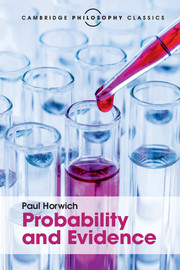Description
Probability and Evidence
Cambridge Philosophy Classics Series
Author: Horwich Paul
This influential book offers a probabilistic approach to scientific reasoning to resolve central issues in the philosophy of science.
Language: English
Subject for Probability and Evidence:
Approximative price 26.37 €
In Print (Delivery period: 14 days).
Add to cart
Probability and Evidence
Publication date: 08-2016
146 p. · 15.2x22.7 cm · Paperback
Publication date: 08-2016
146 p. · 15.2x22.7 cm · Paperback
Approximative price 66.28 €
In Print (Delivery period: 14 days).
Add to cart
Probability and Evidence
Publication date: 08-2016
146 p. · 15.7x23.5 cm · Hardback
Publication date: 08-2016
146 p. · 15.7x23.5 cm · Hardback
Description
/li>Contents
/li>Biography
/li>
In this influential study of central issues in the philosophy of science, Paul Horwich elaborates on an important conception of probability, diagnosing the failure of previous attempts to resolve these issues as stemming from a too-rigid conception of belief. Adopting a Bayesian strategy, he argues for a probabilistic approach, yielding a more complete understanding of the characteristics of scientific reasoning and methodology. Presented in a fresh twenty-first-century series livery, and including a specially commissioned preface written by Colin Howson, illuminating its enduring importance and relevance to philosophical enquiry, this engaging work has been revived for a new generation of readers.
Preface to this edition Colin Howson; Part I. Methodology: 1. Introduction; 2. Aspects of the scientific method; 3. A taste of Bayesianism; Part II. Probability: 4. The primitive theory; 5. Subjectivism; 6. The rationalist interpretation; 7. The logical interpretation; 8. The evidential state; 9. The empirical interpretation; Part III. Confirmation: 10. Explications; 11. The paradox; 12. A Bayesian pseudo-solution to the problem of induction; 13. Projection; Part IV. Induction: Section 1. The Nature of Inductive Inference; Section 2. Conditions of Rationality: 14. Demonstrable reliability; 15. The demonstrable reliability of c+; 16. Immodesty; 17. Audacity; Section 3. The Justification of Induction: 18. The impossibility of a noncircular rationale; 19. Inductive demonstration of reliability; 20. Semantic justification; Part V. Prediction: 21. Surprise; 22. Severe tests; 23. Ad hoc hypothesis; 24. Prediction versus accommodation; Part VI. Evidence: 25. The evidential value of varied data; 26. The value of further data; Part VII. Realism: 27. Popper; 28. Realism versus instrumentalism; 29. Putnam; 30. Glymour; 31. Conclusion; Bibliography; Index.
Paul Horwich is Professor of Philosophy at New York University. He is best known for his contributions to the philosophy of science, including a probabilistic account of scientific methodology. His most recent publications include Wittgenstein's Metaphilosophy (2012) and Truth – Meaning – Reality (2010).
© 2024 LAVOISIER S.A.S.
These books may interest you

Rational Decision and Causality 91.54 €

Rational Decision and Causality 26.37 €

